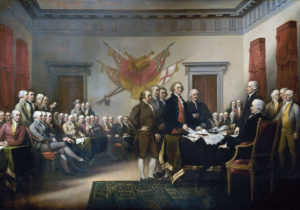For all the criticism of America’s pop culture, there are moments that sometimes move America to be the best version of itself. One of those moments came during this year’s Academy Awards with a moving, tearful speech by former- child-actor-turned-stage-hand-turned-actor, Ke Huy Quan.
Quan won an Academy Award for Best Supporting Actor for the highly unusual yet entertaining film, Everything, Everywhere, All at Once, about a Chinese immigrant family facing financial and relational hardships that find themselves sucked into countless alternate universes and must find a way out of their predicament.
Quan’s speech was not political in the slightest. Still, in a small way, his speech is a great example of what America ought to aspire to. While less than three minutes long, it exudes gratitude, demonstrates the virtues of hard work and the importance of delayed gratification, celebrates family, and pays tribute to lifelong friends. In short, it is everything classically liberal conservatives have celebrated for centuries.
Quan’s speech was tearful, joyful, and totally unpretentious in tone:
Oh, my God! Thank you! My mom is 84 years old and she’s at home watching. Mom, I just want an Oscar!
My journey started on a boat. I spent a year in a refugee camp, and somehow I ended up here, on Hollywood’s biggest stage.
They say stories like this only happen in the movies. I cannot believe it’s happening to me. This is the American Dream. Thank you so much. Thank you so much to the Academy for this honor of a lifetime. Thank you to my mom for the sacrifices she made to get me here. To my little brother, David, who calls me every day just to remind me to take good care of myself, I love you, brother.
Thank you to Kendall for all your support and everything you’ve done. Thank you to A24, to Daniels, Jonathan, Jamie, Michelle, and my Goonies brother for life, Jeff Cohen. I owe everything to the love of my life, my wife, Echo, who month after month, year after year for 20 years told me that one day my time will come. Dreams are something you have to believe in. I almost gave up on mine. To all of you out there, please keep your dreams alive.Thank you. Thank you so much for welcoming me back. I love you. Thank you. Thank you. Thank you.
Beyond the tone, the context adds a lot. Quan, a Vietnam-born ethnically Chinese American who, as he alluded to in his speech, came to America as a refugee when he was seven, was a child star in such films as Indiana Jones and the Temple of Doom and The Goonies, but as he grew found the market for Asian actors lacking. He went to film school, still desiring to be an actor, but found himself in behind-the-scenes jobs like stunt coordinator and assistant director, among other unglamorous roles in the industry.
Quan was inspired by the success of 2018’s Crazy Rich Asians to try again. Amazingly, in his first major role in over 30 years, he knocked it out of the park and won an Academy Award.
But rather than “I told you so,” or scolding Hollywood for having too few parts for Asian Americans (something he nonetheless believes is true), the spirit of gratitude seems to exude from everything he does. There’s no sense of entitlement for his talent, no sense of bitterness for the decades of less glamorous work, but a sense of profound joy at his opportunities. By my reading, every line in his speech is about gratitude.
Yural Levin says, “Conservatives tend to begin from gratitude for what is good and what works in our society and then strive to build on it,” and Quan is an excellent example. He wants to improve both his own lot and the lot of Asian Americans in Hollywood, but also wants to build, not tear down, opportunities, for others.
Furthermore, the 20-year dry spell, in Quan’s telling, doesn’t seem to be about a lost opportunity or a regret about what could have been. Rather, it’s about being willing to put in hard work so that “one day my time will come.” While he is quite different from the Hollywood establishment, both in career trajectory and manner, he loves Hollywood without a hint of resentment. He celebrates his director, his co-stars, current and former, his production company, and “Hollywood’s biggest stage.” He loves his industry. Again, such gratitude.
While he is the embodiment of the American Dream, Quan’s understanding of that dream isn’t about money or status. Instead, it embodies all the other aspects of his life: his modest circumstances, fiercely supportive family, patience, and gratitude for the right opportunity that finally came.
Modern conservatives don’t celebrate immigration the way they should, but that’s not always been the case. Indeed, Quan’s immigration story is one straight out of Ronald Reagan’s “Shining City on a Hill” address which celebrated stories like Quan’s:
The crew spied on the horizon a leaky little boat. And crammed inside were refugees from Indochina hoping to get to America. The Midway sent a small launch to bring them to the ship and safety. As the refugees made their way through the choppy seas, one spied the sailor on deck and stood up and called out to him. He yelled, “Hello, American sailor. Hello, freedom man.”
A small moment with a big meaning, a moment the sailor, who wrote it in a letter, couldn’t get out of his mind. And when I saw it, neither could I.
One of those refugees from Indochina that made it to America was Quan. And he made good on the promise that is America; not its wealth and power, but its gratitude, acceptance, vital institutions, and opportunities to use talent to make your fellow man’s life better. I think it’ll take Americans a few weeks, or hopefully longer, to get Quan out of their minds.





